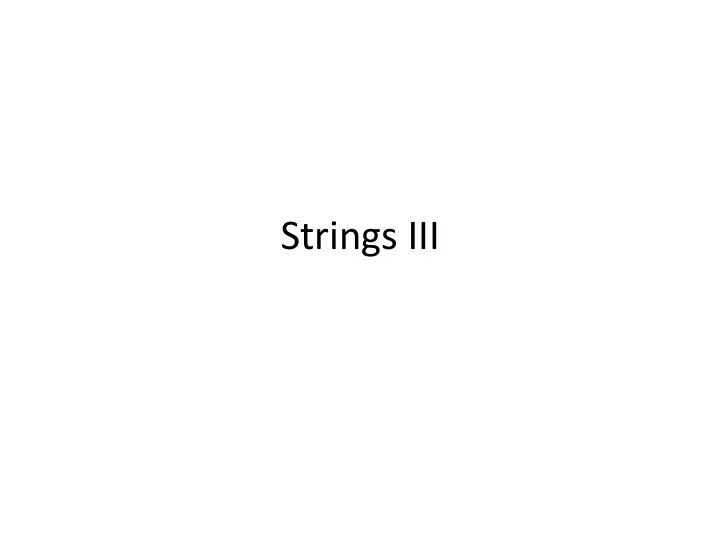

Strings III
Warmup: Write a function called total_seconds that takes one string argument. This argument will be a string of the form "M:SS" where M is a number of minutes (a single digit) and SS is a number of seconds (2 digits). This function should calculate the total number of seconds in this amount of time and return it as an integer. (Don't need a for loop!) Hint: use the int() function to convert each component to an integer. def total_seconds(time): Challenge: Make your function work with strings with a one- or two-digit minute component.
Review: Indexing/Slicing/Length • If s is a string variable, • s[p] returns character at index p . • s[p:q] returns slice from characters p to q-1 . • len(s) returns the length of s (number of characters)
• Slices don't need both left and right indices. • Missing left index: – Python assumes you meant 0 [far left of string] • Missing right index: – Python assumes you meant len(s) [far right of string] s = "Computer" print(s[1:]) # prints omputer print(s[:5]) # prints Compu print(s[-2:]) # prints er
Indices don't have to be literal numbers Say we have this code: name = input("type in your name: ") x = int(len(name) / 2) print(name[0:x]) What does this print?
Basic for loop • To do "something" with every character in a string s: for pos in range(0, len(s)): # do something with s[pos]
Basic counting for loop total = 0 for pos in range(0, len(s), 1): if _______________: Put an "if" test involving s[pos] total = total + 1 here.
Count the number of lowercase a's total = 0 for pos in range(0, len(s), 1): if s[pos] == "a": total = total + 1
Count the number of any a's total = 0 for pos in range(0, len(s), 1): if s[pos] == "a" or s[pos] == "A": total = total + 1
True if s is a substring in t s in t False if s is a substring in t s not in t True if s contains only letters s.isalpha() True if s contains only digits s.isdigit() True if s contains only lowercase s.islower() letters True if s contains only uppercase s.isupper() letters True if s contains only whitespace. s.isspace()
Count the letters total = 0 for pos in range(0, len(s), 1): if s[pos].isalpha() total = total + 1
Count the uppercase letters total = 0 for pos in range(0, len(s), 1): if s[pos].isupper() total = total + 1
Count the vowels total = 0 for pos in range(0, len(s), 1): if s[pos] in "aeiouAEIOU" total = total + 1
String concatenation • Have string variables s and t : • s + t gives you a new string with all the characters of s followed by all the characters of t. • s and t are not changed! – Just like if you say x = y + z , where all your variables are integers, y and z don't change.
What does this code do? answer = "" for pos in range(0, len(s)): answer = answer + s[pos]
s = "banana" answer = "" for pos in range(0, len(s)): answer = answer + s[pos] pos 1st iteration 0 1 2 3 4 5 pos: 0 s[pos]: "b" "b" "a" "n" "a" "n" "a" answer: "b" s[pos]
s = "banana" answer = "" for pos in range(0, len(s)): answer = answer + s[pos] 2 nd iteration pos 0 1 2 3 4 5 pos: 1 s[pos]: "a" "b" "a" "n" "a" "n" "a" answer: "ba" s[pos]
s = "banana" answer = "" for pos in range(0, len(s)): answer = answer + s[pos] 3 rd iteration pos 0 1 2 3 4 5 pos: 2 s[pos]: "n" "b" "a" "n" "a" "n" "a" answer: "ban" s[pos]
s = "banana" answer = "" for pos in range(0, len(s)): answer = answer + s[pos] 4 th iteration pos 0 1 2 3 4 5 pos: 3 s[pos]: "a" "b" "a" "n" "a" "n" "a" answer: "bana" s[pos]
s = "banana" answer = "" for pos in range(0, len(s)): answer = answer + s[pos] 5 th iteration pos 0 1 2 3 4 5 pos: 4 s[pos]: "n" "b" "a" "n" "a" "n" "a" answer: "banan" s[pos]
s = "banana" answer = "" for pos in range(0, len(s)): answer = answer + s[pos] 6 th iteration pos 0 1 2 3 4 5 pos: 5 s[pos]: "a" "b" "a" "n" "a" "n" "a" answer: "banana" s[pos]
What does this do? answer = "" for pos in range(0, len(s)): if s[pos].isupper() answer = answer + s[pos]
COUNT total = 0 for pos in range(0, len(s), 1): if <test s[pos] for something>: total = total + 1 FILTER answer = "" for pos in range(0, len(s), 1): if <test s[pos] for something> answer = answer + s[pos]
COUNT def some_counting_function(s): total = 0 for pos in range(0, len(s), 1): if <test s[pos] for something>: total = total + 1 return total FILTER def some_filtering_function(s): answer = "" for pos in range(0, len(s), 1): if <test s[pos] for something>: answer = answer + s[pos] return answer
Recommend
More recommend